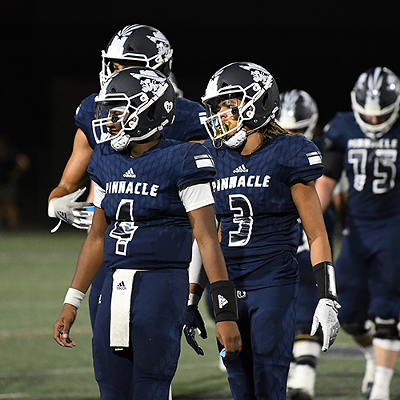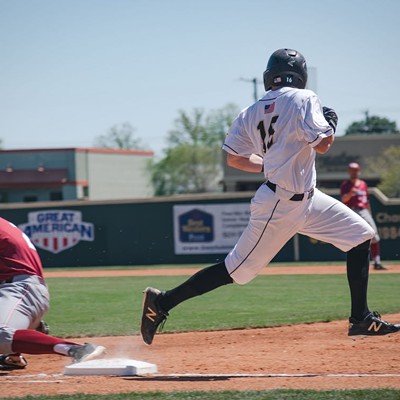Brooks sighs and says, "Oh, you know, Vietnam ... this."
More and more, it appears that coaching is becoming a no-win situation, and it took a giant step in that direction last week when Tim Nicolis, the first-year coach of the Canyon Del Oro High School girls basketball team, resigned with three weeks left in the regular season. Nicolis cited "severe parent issues," which may have even included a death threat.
There are a million ways to evaluate a coach's success, the last of which should be his won-loss record. But even there, Nicolis was 12-8 in his abbreviated stint with the Dorados. That means that his team had won 60 percent of its games and somebody still wanted to kill him.
When the story first hit, several of my friends told me that it was a natural thing for me to write about. In fact, just a couple months ago, someone in the publishing industry approached me to write a book about sports. He asked me to give him some possible topics and I, being a lazy lout, suggested a Studs Terkel-esque oral history of coaches recounting their most horrendous parent stories.
Every coach in America has stories about outrageous people. I coached freshman girls basketball at Salpointe one year and I had a girl who was an excellent basketball player. Alas, the kid couldn't spell T-E-A-M if you handed her a talking flash card with the word written out on it.
The kid raised selfishness to an art form. She started the first game for me and after sitting through her 16-point performance (the total of which she informed me of as she came off the floor), I had seen enough. Her playing time diminished steadily as the season progressed, although she (as did all of the other players) still got in at least once in every half of every game. She still ended up being the fourth-leading scorer on an undefeated team.
Her father, a retired airline pilot, used to sit up in the stands with a stopwatch and a clipboard and time how long she played in each game. By the end of the season, she was the last person on our 13-girl squad to get in the game. Finally, he came up to me one day and said, "Can you tell me why Alison is the 13th person to get into the games?"
I replied, "Because we don't have 14."
I told the publisher a couple other stories and he was actually intrigued by the idea. He then asked what I would call such a book. I said, "How about, Parents Are Rectums?"
I'm still waiting on that callback.
I've been in coaching for a long time, and my experience is that the vast majority of athletes' parents range somewhere between completely benign to absolutely delightful. They change their schedules around to accommodate their kids and drive all over the city (and often the state) to watch the games. They sit in the stands in hot gyms and hotter baseball stadiums and root for the players. And when the game is over, they pat the kid on the back if she wins and console her if she loses. This picture of the parents is unexciting and therefore goes largely unreported.
These are the so-called soccer moms who are reviled and revered by political pundits. Sure, they want their kids to start every game and play a lot of minutes. They want them to make the winning basket and get their names in the paper. But most will gladly settle for the opportunity to watch their kids sweat and struggle, to win with glee and lose with dignity, to give it their all and come away with some close friends and maybe a life lesson or two.
Unfortunately, there are exceptions, and they often involve a person who either experienced athletic success on their own and then expect it of their children, or those who are successful in other endeavors and somehow think that it will carry over into everything with which they have contact.
Well, you know what? Sometimes rich kids strike out and sometimes poor kids hit home runs. I think that's why sports are so popular in America. It's the most democratic of all public arenas, a place where talent and determination can take one a long, long way up the ladder of success.
I've heard stories about the most abusive parent at CDO, whom the dailies refuse to name. Apparently, he's a real doozy. He also had a lot to do with the previous coach, Phil Reynolds, leaving after two seasons at the far northwest-side campus.
I worked with Phil Reynolds for three years at Amphi, and I can tell you he's a dedicated guy. He works at basketball camps, attends clinics, workshops and seminars, hangs around other coaches and spends his nights off watching other teams play. He lives and breathes basketball. The three years that I worked with him, his varsity teams won almost 60 games, made three trips to regionals and two to state, and won the only girls basketball conference championship in the school's history.
(Of course, he came to view my, shall we say, free-wheeling coaching style as an abomination and me as the Coaching Anti-Christ, but that's another story.)
He probably saw the move up to CDO as a trip to greener pastures, but boy, was he in for a surprise.
The Amphi District is kicking around the idea of a code of conduct for parents at sporting events. But you've got to believe that such a code will be the equivalent of a yield sign. A good driver reads it as "slow down and stop (if necessary) until it is safe to proceed" while the rectum driver reads it as "ignore this sign and do whatever the heck you want."
We'll never know if Tim Nicolis was a good coach. All we can do now is sit and watch with horror and amazement at who will be crazy enough to take that job next.










